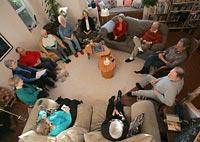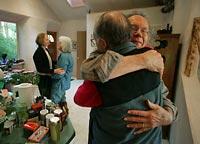Elderly seek to grow old together, form new support groups

The trusted friends — most in late midlife, a few far beyond — don't look like adventurers as they sit in their stocking feet and slippers around a flickering candle in the comfy living room of a Whidbey Island home.
But they've gathered once again as members of the Circle of Caring, a community they intentionally created to explore the daunting territory of growing old — its countless apprehensions, existential questions and practical needs for care.
"Growing old is scary," said Cynthia Trenshaw, one of the group's founders. "I don't want to be alone and isolated."
The 18-member circle, which has met in members' homes twice a month for the past four years, has caught on so well that four other such circles — each organized around the subject of aging — have formed on Whidbey in the past two years.
"There's a great thirst, for people who are approaching their later years, to be able to talk frankly about what it's like," said member Ellen Camin, 70, a retired community activist. "It's not something younger people really understand."
Some describe this elder-circle phenomenon as oh-so-like-Whidbey, a bucolic, slow-paced place that attracts lots of open-minded retirees with flexible schedules.
But, the circles really are another significant sign that baby boomers — and the generation just a few years ahead of them — are starting to create new kinds of community to support their emotional, spiritual and physical needs in later life.
Instead of adopting the idea of "aging in place," many boomers now talk about "aging in community." But they want to be the ones to define what "community" means.
Nationwide movement
The grassroots phenomenon, playing out in bits and pieces around Puget Sound, ranges from an association on the south shore of Hood Canal named Fiercely Independent Elders to plans for co-housing projects for older adults to relationship-building support groups reminiscent of the consciousness raising of the '60s.
It's part of a nationwide movement often described as "conscious aging," "pro-active aging" or just plain old aging on your own terms.
"We're not a society that wants to admit aging," said Bolton Anthony, the founder of Second Journey, a nonprofit association based in North Carolina that's dedicated to creating a new vision of aging. "It's about recognizing this is a different stage of life that comes with its own gifts and responsibilities."
This summer, Bolton's group will hold its sixth regional Visioning Council, this time at the Whidbey Institute on Whidbey Island. The idea is to connect Northwesterners who have diverse ideas about what new models of community should look like. Open to the public, it hopes to attract architects and developers, educators and activists, social entrepreneurs and visionaries.
"This is just springing up all over the place," said Christine Jensen, 59, a professor at Seattle University, who with a small group of older friends is looking for a home to cooperatively buy that they'll share in retirement.
"What's going to happen to Medicaid and Medicare is horrific. I think we need to be prepared for other ways of looking after each other."
Early visionaries
In 1990 on Hood Canal, a group of neighbors and friends, now all in their 80s and 90s, became early visionaries for how to create a new kind of community as we age. Over the years, there have been 12 members, but never more than eight at one time.
They wanted to find a way to stay in their own homes, increase their well-being and usefulness and "die gracefully and happily with no fuss and feathers," explained Patricia Hanson, one of the group.
When they couldn't find anything to join, they formed a nonprofit association, called the Fiercely Independent Elders, and put money in a bank account to hire a facilitator.
The facilitator regularly assessed their mental and physical status and arranged help at home during illnesses. The elders gave written permission that serious health problems could be reported to their children.
Through the years, they've also tapped the kitty to contribute to mutually agreed-upon causes and, occasionally, volunteered together. They've helped each other write advance directives for end-of-life care and whatever they learn gets filed in their special library.
At monthly business meetings, every elder participates in the "organ recital," a truthful assessment of how they're feeling.
"It makes people aware they aren't the only ones suffering from itchy skin or macular degeneration," Hanson said.
At a weekly social, the members — who now number seven — their friends and families drink a little wine and, occasionally, present dramatic or poetry readings. Politicians seeking votes may be invited, as may guest speakers on topics such as the cost of burials.
Wrestling time
It's also a time to wrestle with the spiritual and emotional side of aging — wondering, "What the hell you're doing in this life, and what am I hanging around for," said Ray Hanson, Patricia's husband, who just turned 90.
The Hood Canal elders are currently advising others, now in their 60s, about how to start communities around aging.
In Seattle, older adults, some of whom are downsizing out of bigger houses, are starting to wonder how to create a cooperative housing community for their golden years.
"It just keeps coming up all the time," said Penny Bolton, a Windermere real-estate agent in Seattle. "I've had several groups of people say, 'If we could just find some kind of building to buy.' "
Local financial consultant Valerie Margulis, 53, and other middle-agers are serious about wanting to invest in an apartment building, hold it for several years and redevelop it as their own elder co-housing — communities created and managed by residents who live in private homes but share common areas and activities such as cooking.
Ideally, the design will be beautiful and homelike, facilitating aging both socially and physically — an urban oasis where residents will support each other.
"I think my generation is becoming more and more aware of issues of aging and maybe not liking what we see our parents facing in terms of housing options," Margulis said. "There's a desire for more community in daily life, to get more in touch with people on a personal level."
Mutual support
Other middle-age professionals in Seattle, people who have no plans to move in together, are facing up to eventual old age through a mutual support group called Women Aging Gracefully.
"Instead of denying it, they decided to move into it," said the group's oldest member, Denise Klein, 63, director of Senior Services, a private nonprofit agency in King County.
Klein likens these Graceful Agers to the Consciousness Raisers of the 1960s. Only their focus is different. Instead of feminism, the group meets monthly to discuss things like the empty nest, creativity in later life, physical changes that come with menopause and end-of-life planning.
Klein participates not so much to glean insights about aging but to increase her own social-support network for later life. And she hopes to set up similar support groups on a broader scale as part of her role with Senior Services.
On Whidbey Island, the idea to create an elder circle grew from a conversation during which a few friends admitted to harboring uncomfortable questions about how to hang on to relationships and get proper care as they aged. They wanted to explore spirituality and wished to pass on their wisdom and share their joys and regrets.
But who would listen?
Since no ready-made group existed, they decided to invite others to share what was in their hearts about growing old.
Along the way, the name Circle of Caring was adopted.
"The process of talking about it rather than burying it and trying to ignore it has been very helpful," said Bernie Camin, 75, a former Hughes Aircraft design executive and small-business owner.
Elders become teachers
The original group — both men and women, ages mid-50s to mid-80s, retired and still working — are university professors, medical professionals, business executives, artists and chaplains. Many have been involved in support groups at earlier times in their lives.
Younger members learn from their elders — "I find that very rich," said Barbara Lamb, 57.
The two-hour gatherings are somewhat structured, confidential and use rituals to encourage communication. A lighted candle marks the circle's center, a reminder of the intention to support each other through aging. Often a talking piece — a flat, oval stone — is passed from one to the other. Whoever holds the stone may speak without interruption.
On this particular evening, a few in the circle confess fears.
"My fear is not so much the dying process but the aging process," said one.
"What I fear most is pain," said another.
"I worry about being alone," said yet another. "I'm not married. So there's nobody really there."
They have helped each other in times of temporary illness and need.
But so far, the circle has not formally committed to care for each other in serious sickness or to stand by, no matter what, at death.
Trenshaw believes that will be a true test of their community.
Marsha King: 206-464-2232 or mking@seattletimes.com

Resources![]()
![]()
Ideas for starting a circle focused on aging can be found in the booklet "A Harvest of Years: A PeerSpirit Guide for Proactive Aging Circles," by Cynthia Trenshaw.
Trenshaw describes how the Circle of Caring on Whidbey Island started, lists qualities that mark a good participant and gives basic guidelines for interaction. The structure for the Circle of Caring is based on the work of Christina Baldwin, an author who lives on Whidbey Island.
For a copy of "A Harvest of Years," call PeerSpirit, 360-331-3580. The cost is $7, plus postage.
"Creating Community in Later Life," a 2006 Regional Visioning Council conducted by Second Journey, will be July 13-16 at the Whidbey Institute on Whidbey Island. For information: go to www.secondjourney.org/2006Councils.htm